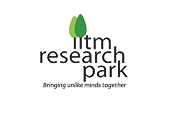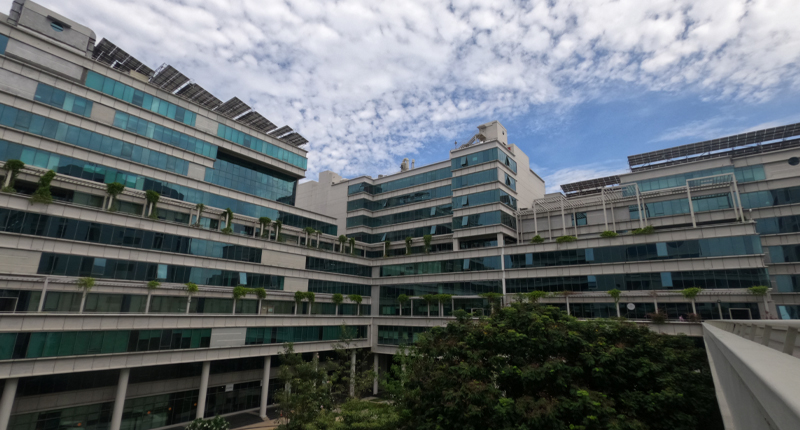Over the last two decades, the faculty at IIT Madras took a conscious decision to concentrate more on translational research — to focus not just on research but also on commercialisation. This and the subsequent establishment of the IIT-M Research Park has resulted in the incubation of over 200 deep tech companies, whose valuation run over Rs 50,000 crore.
Chennai, March 16, 2023:
Hailing from a family that has produced businessmen over three generations, Kolkata-born Ankit Poddar terms himself as the ‘odd one out’ for choosing to study engineering, specifically computer engineering, in the early 2000s.
However, in 2008, his wish to do something more “hands on” rather than “writing mostly code” pushed him towards building his own products, which ultimately drove him to Professor Ashok Jhunjhunwala, the president of IIT Madras Research Park, a not-for-profit company associated with IIT Madras.
Back then, 70-year-old Jhunjhunwala was heading an incubation cell out of the research park and Poddar had heard how it was encouraging and supporting aspiring entrepreneurs like him.
So, by 2009, Poddar shifted to Chennai, specifically to IIT Madras, to work on multiple projects, supplemented by the institute’s strong ecosystem of academia, research and industry. “I was spending more time working on projects rather than attending lectures for my college degree,” Poddar told Moneycontrol.
In 2012, Jhunjhunwala gave him a problem statement to work on: The 4-lakh sq ft Phase 1 of the (IIT Madras) research park had just been commissioned and Jhunjhunwala observed that the airconditioning system of the place was not running in a very efficient way. The automation system that was installed was quite complicated.
“So the professor asked me to work around this to see how things can be improved. The professor said that if it works out, and if a good business model can be created, then there’s scope of a startup being very successful,” Poddar said.
Subsequently, Poddar was appointed as a project associate in IIT Madras and he started working on Jhunjhunwala’s problem statement. Poddar recalls that the research park gave all the initial support “not only by exploring technologies and experimenting on the machines, but the initial development/research cost was borne by the research park”.
Over the next two and a half years, he developed a solution that has increased the research park’s energy efficiency.
Finally, in 2015, based on the successful results at the IIT Madras Research Park, Poddar founded ZedBee, a startup that offers IoT-enabled platforms with sensors and cloud interface providing varying heating, ventilation and air conditioning (HVAC) capacity. As of now their systems are running in 100 buildings across the country including malls and IT parks.
This is just one example of the massive impact that IIT Madras and the research park, located at Tharamani in Chennai, have had over the last two decades in the development of deep tech startups like ZedBee, thus earning itself the moniker of being ‘India’s deep tech haven’.
The list of startups that have been incubated run north of 200, which includes notable companies such as electric vehicle maker Ather, conversational AI platform Uniphore (which is also a unicorn), space tech startup Agnikul Cosmos, dairy IoT company Stellapps and so on. Their cumulative valuation according to Jhunjhunwala is around Rs 50,000 crore.
Apart from those incubated in IIT Madras, the list of companies in India who have at least one co-founder from the institute is well over 700, with seven of them unicorns, data from Tracxn showed. These companies have cumulatively raised $10.6 billion in funding.
So what makes the IIT Madras ecosystem such an attractive place for an aspiring entrepreneur?
Not just real estate
“Over the last 20 years, my predecessors Professor Bhaskar (Bhaskar Ramamurthi) and Professor Ananth (MS Ananth), have been working on what we call translational research (and we thought) why don’t we convert our ideas that are on paper into something on the field as a product,” said Professor V Kamakoti, director of IIT Madras.
“To give a good shape to this, one of the things that we started very early, say around 2007-2008 as a proposal, was the IIT Madras Research Park (IITMRP), which actually makes a big difference, because all the inmates, be it a researcher or industry, they need to have a level of contact with IIT Madras,” Kamakoti said.
Established in 2008, Phase I of IITMRP became operational in March 2010 and was fully occupied by 2012-3. The work on Phase II of IITMRP commenced in 2013-14 and it has a built-up area of over 8 lakh sq ft, research blocks catering to IT, mechanical, electronics, bio-sciences, etc, and has been fully operational since 2017.
The research park also houses the IIT-M Incubation Cell, which acts as a ‘mother incubator’ to other incubators including Pravartak, Rural Technology Business Incubator and BioIncubator. It also houses around 18 centres of excellence concentrating on varied sectors.
Kamakoti noted that the type of contact industry/researchers can have with the IIT Madras ecosystem can be varied. “They can give us a project, they can hire our faculty as consultants, they can hire our students; their students come and do PhD—for everything we have a point system,” he said.
“And any company intending to continue in that place for more than some years should satisfy this point. It’s not just real estate. We are looking at collaboration,” he added.
For Infosys co-founder Kris Gopalakrishnan, what differentiates IIT Madras from others is the commitment and active engagement of various stakeholders. Gopalakrishnan, an IIT Madras alumnus, was earlier a member of the institute’s board, and has also supported the institute’s various research centres, centres of excellence and so on.
“The IIT Madras ecosystem consists of entrepreneurial professors and scientists, industry leaders who provide support and mentorship, funding from angel and VC investors, government support and a very large and active alumni who play all the above roles. The key differentiator in my mind is the commitment and active engagement which is the secret ingredient,” Gopalakrishnan said in a statement to Moneycontrol.
For Zetwerk co-founder Amrit Acharya, another alumnus of IIT Madras, it is the ‘strong technical orientation’ of the institute that has made a difference.
“IIT Madras historically, at least to my knowledge, has had a very strong technical orientation. A lot of the people we looked up to, that people used to go to, they did their PhDs in Stanford or Berkeley and in very technical fields. So in some way, we are emulating them, in a more business context,” he said in an interview to Moneycontrol last year on the show Bits to Billions.
Converting R&D into value
When Tamil Nadu-based Arun Prakash and SP Balamurugan first founded edtech platform Guvi in 2014, they were, according to themselves, “more of tech people”. They did not have enough knowledge about the business side of entrepreneurship.
So they joined the IIT Madras Incubation Cell in 2014 where they were taught “monotonous things” like accounting, filing and keeping books. “All those things are necessary for any entrepreneur, because these are things that are essential for a company to grow,” Prakash said.
Not just that, the research park connected Guvi with a lot of mentors. They were also, at times, at the receiving end of Jhunjhunwala’s scoldings, Balamurugan said in a lighter vein. “That is part of the journey as well,” he said, adding that for the first three years, the research park took care of their office space.
The initial lack of business acumen among researchers is often one of the reasons why many projects in research and development often never translate into commercialisation.
“By and large, traditionally, scientists, all over India, maybe many parts of the world, were confined to their lab. They do R&D, they get the results, they publish and they are happy, they get promoted, they will get rewarded,” Jhunjhunwala said in an interview with Moneycontrol.
“Pretty much that’s what they considered their job. Taking whatever your findings have been all the way, translating it into a product which serves society, which gets into society, or commercialising the product at scale was never our focus.
“From day one, my focus has always been: how do you not just carry out R&D but take it to commercialisation? And that’s what I have been doing. Yes, probably IIT Madras has done a little more than what others have. But I’ll still say what IIT Madras has done is quite limited. All others are starting to do so and we need to really focus on scaled commercialisation,” he added.
The faculty participation
It is not just the students, research associates and members of the incubators who are a part of the innovation ecosystem at IIT Madras. At least 40 per cent of the institute’s faculty have worked or are working on startups of their own, IIT Madras director Kamakoti said.
Last year during a Moneycontrol interview, Zetwerk’s Amrit Acharya in a lighter vein had commented that when professors (of IIT Madras) become entrepreneurs, they do not start “food-delivery companies”, instead they would work on something technology-intensive, and in their specialisation.
That claim indeed holds true, as one such professor, Satyanarayanan Chakravarthy, is a co-founder of hybrid electric plane start-up e-Plane, space tech start-ups such as Agnikul Cosmos and GalaxEye Space, and micro-gas turbine maker Aerostrovilos.
“I think the number of faculty around the world who are into entrepreneurship at the level that I do—I’m not saying that is much—but there are only a few people who will probably take a long leave of absence or choose not to get paid,” Chakravarthy told Moneycontrol in an interview.
“And then because you’ve been a faculty for quite some time you get in the comfort zone, right. And you don’t want to step out of your comfort zone. So you actually look for any co-founders who might come up to you and discuss ideas to commercialise, and then you can support them, you can advise them,” he said, adding that the faculty involvement happens at “fairly higher rate” at IIT Madras than at other institutes.
Ninety-nine percent of Chakravarthy’s time now is devoted to e-Plane which last year raised $5 million in funding, and he works as an advisor for the other startups he is involved with.
Thus it’s evident that it’s not just the contribution of a single stakeholder in silos, like students or researchers or faculty that makes IIT Madras a hub of innovation in the country but a collaborative effort of the entire ecosystem which includes industry and academia.
Going forward, IITMRP director Jhunjhunwala said that more effort has to be put in creating solutions that emit less greenhouse gases and towards achieving net-zero goals.
Read more by clicking on the link to the featured article below:


